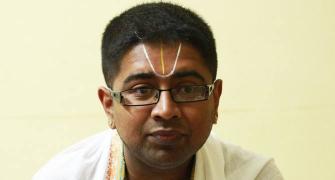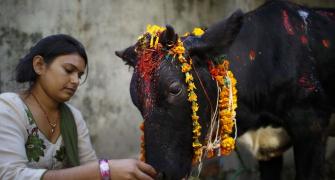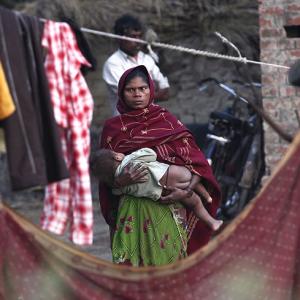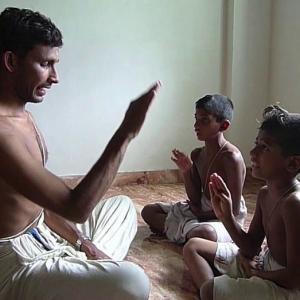'The appointment of 60 priests from the Dalit community is a historic moment.'
'Imagine this is happening in Kerala when Dalits are not even allowed to enter temples in some states even today.'
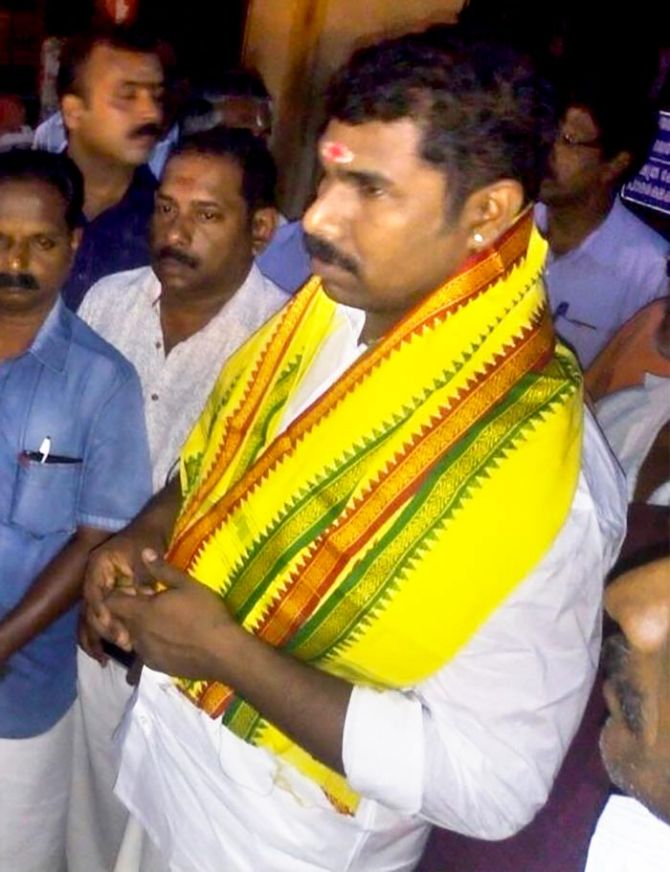
The Vaikom Satyagraha in 1924 that led to the entry of Hindus from all castes into temples is considered a landmark event in Kerala's history.
The Vaikom Satyagraha also allowed the so-called 'untouchables' to use roads near the temples and other places which were the exclusive domain of upper caste Hindus in Kerala.
Mahatma Gandhi visited Vaikom to support the satyagraha's leaders. He also met the regent maharani and the minor Maharaja Sree Chithira Thirunal of Travancore which resulted in the opening of roads near the temple except the eastern one to the so-called 'untouchables'.
The Vaikom Satyagraha also led to the historic Kshetra Pravesana Vilambaram or the Temple Entry Proclamation of Travancore on November 12, 1936 which allowed the entry of the so-called 'low-caste people' or avarnas into Hindu temples in the princely state of Travancore.
This proclamation is a milestone in Kerala's history as it resulted in many major social reformations in the state.
Eighty-one years after the historic event, a non-Brahmin priest from the backward Ezhava community was prevented from taking charge as the keezh santhi (assistant priest) at the famous Chettikulangara Bhagavathy Kshetram in Mavelikara.
Sudhi Kumar -- the Ezhava priest who has been working as a santhi (priest) for the Devaswom Board for 19 years -- told Rediff.com's Shobha Warrier that it was the first time that he has had to face such discrimnation.
I was born in a very ancient tharavadu (ancestral home) near Haripad where we have been associated with temples as pujaris (priests).
My grandfather studied to be a santhi from Vaikom Gopala Thantri who learnt the rituals directly from Sree Narayana Guru. My family have been priests for three generations.
After my grandfather and my father, I joined the same profession. You can say we are traditionally priests.
From a very young age, I used to go with my grandfather to the temples as his assistant, but the puja he performed was what was taught by Gurudeva (Sree Narayana Guru) which is different from what is followed in other temples.
As our tharavadu was surrounded by the houses of Namboodiris who taught the Vedas to children, I grew up hearing the chanting of Vedas and prayers.
I was so drawn to it that at the age of 14, I decided to go and learn the Vedas from a pandit of the Vedas who was not a Namboodiri.
You should understand that even in those days, learning of the Vedas was not the domain of the Namboodiris alone; anyone interested could learn the scriptures.
By 19, I had learnt enough to be an independent santhi in a temple.
While I worked as a santhi, I also learnt the YajurVeda rituals from a Namboodiri for three years. Then I applied for a job at the Devaswom Board. After a test and an interview, I was selected as a santhi.
When I joined in 2004, there were only a handful of non-Brahmin priests with the Devaswom Board. Today, there are about 500 priests belonging to the Ezhava community.
Other than the Namboodiris, there were priests only from the Ezhava community. That was because even when chatur varna was observed, people from the Ezhava community were priests in the temples of Bhadrakali, Maadan etc and also because of Gurudeva's efforts.
Other than Devaswom Board temples, there are thousands of temples in Kerala that followed Gurudeva's traditions.
In all these temples, the priests were non-Brahmins. But the temples under the Devaswom Board only had Namboodiris as priests.
In 1986 when Prakulam Bhasi was a member of the Devaswom Board he decided to teach santhi (the rituals of puja) to men from the Ezhava community. He even gave them the title 'Sharma' and later appointed them as pujaris in temples.
I have been performing my duty as a santhi from the age of 19, but I had not experienced any discrimination from anyone, neither from the temple authorities or the bhaktas (devotees) till now.
On the 19th of June 2017, the Devaswom Board transferred me to the Chettikulangara Devi Khetram as keezh santhi (assistant priest).
This temple is considered the second most important temple after Sabarimala and the area is dominated by savarnas.
When I was transferred as the keezh santhi, it was for the first time that a non-Brahmin was appointed a santhi at the temple.
When the temple authorities discovered that I, a non-Brahmin, would be the keezh santhi , the temple's thantri (head priest) wrote to the Devaswom Board that it was not possible to have a non-Brahmin as a santhi in the temple as the Devi would get angry.
It was also mentioned in the letter that only a Namboodiri would be able to conduct the pujas at the temple and not a non-Brahmin.
I had paid obeisance to the thantri when he visited a temple where I was a santhi. When I found out that he had sent a letter like this, I had tears in my eyes. I did not expect him to say such things against me.
The fact is no temple under the Devaswom Board can discriminate against any santhi as under the Board, there is no difference between a Brahmin santhi and a non-Brahmin santhi.
The Hindu Matha Convention acquired a stay against my appointment, but the high court did not accept the stay as it was a human rights violation.
The high court asked the temple to continue the status quo as the temple authorities had said that my appointment would create communal tension in the area.
The high court instructed the Devaswom Board commissioner to take a decision, and he cancelled my transfer!
The cancellation of my transfer created a big uproar in the state. That was when the SNDP (the Sree Narayana Dharma Paripalana Yogam, an Ezhava organisation) the CPM (the Communist Party of India-Marxist which heads the Kerala government) etc entered the scene and started a statewide protest against the decision.
When it came for discussion in the assembly, the Devaswom Board minister said that the government would see to it that I would be re-appointed at the same temple.
On the 26th of September, an order was passed asking me to join the temple and the very next day, amidst hundreds of people from the SNDP and CPM cheering, I joined the temple.
I didn't go to court personally as I knew Devi would see to it that I would get justice, and I did.
I have to say that nobody has said anything bad to me after I joined; everybody is cordial and welcoming.
A new melsanthi (the main priest) has come to the temple; he is the son-in-law of Narayana Bhattathiri, my guru for four years.
My guru comes to the temple quite often and introduces me to all the people as 'his son'. That is the kind of love he has for me.
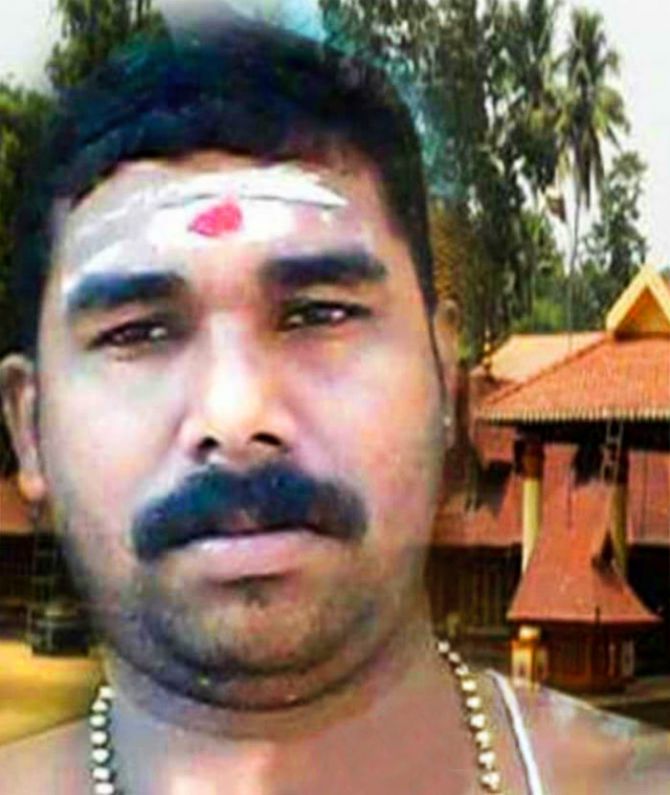
An incident occurred the day I was to take charge. The main santhi at another temple came to my home and threatened my wife that if she did not stop me from joining as the keezh santhi, his people would kill me.
It was the first time in my life that I felt discriminated against because of the caste I was born in.
My question is, will the Devi of the temple discriminate among her bhaktas based on caste?
To Her, there is no difference between black or white, Brahmin or non-Brahmin, rich or poor, man or woman; all are Her bhaktas.
No God would differentiate between who does the puja, it is immaterial whether it is a Namboodiri or me or Yadhu Krishna (the first Dalit santhi).
The question is: Who is actually a Brahmin?
Let me say: All are born as sudras, only when you acquire knowledge (brahma jnanam) do you become a Brahmin.
We are taught that you are a Brahmin by karma and not by birth.
Nobody become a Brahmin by birth. Veda Vyasa (who wrote the Mahabharata) was born to a fisherwoman.
If you ask me why I decided to be a santhi, I feel I was born to be one.
From the time I could remember, bhakti was the dominant feeling I experienced.
It was after I was denied permission to join the Chettikulangara Devi Kshetram that the state government decided to have priests from the scheduled castes/scheduled tribes for all temples under the Devaswom Board.
The appointment of Yadhu Krishna and 60 others from the Dalit community as santhis is a pathbreaking move by the government, a historic moment.
Imagine this is happening in Kerala when Dalits are not even allowed to enter temples in some states even today.


